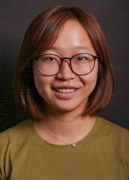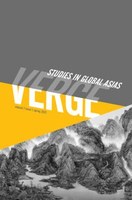Being “International” in U.S. Graduate School

In his first national prime-time address as the US President, Joe Biden condemned the violence towards Asian Americans, a group that has, unfortunately, seen an uptick in reported hate crimes since the beginning of the COVID-19 pandemic. “It’s wrong, it’s un-American, and it must stop,” declared President Biden. While much of the critical attention has been focused on the Asian American and Pacific Islander communities, anti-Asian racism is motivated by ideas about Asian “foreignness.” Accordingly, it affects the wider Asian community in the US, not least of all the international graduate students in Penn State’s English department who identify as part of the Asian diaspora. In this article, some of these students reflect on their time at Penn State and how the current events have shaped their experiences and their research.
Regardless of the country they are from, international students in the US embody a precarious position. The common challenges one might face include anxieties over visa status, cultural adjustment, the prospects of staying and working in the US post-graduation, and a general sense of alienation resulting from being far away from home, a feeling heightened during the semester breaks. And while club societies or cultural associations are often sought out by international undergraduates, the demands of coursework and teaching loads leave graduate students with less time for such socialization.
In spite of these challenges, however, there are also possibilities that emerge from being “international” as it relates to one’s teaching and research interests. As Yafang Luo, a second-year M.A. student from China, puts it, “It is always fascinating to see how American authors and theorists have benefited from their conversations with nonwestern traditions.”
 Luo, whose interest in Transcendentalism developed in a graduate seminar on Henry David Thoreau and Ralph Waldo Emerson at Peking University, was taken by Penn State’s long tradition in American literary studies, especially in the field of nineteenth-century studies. While Luo’s interest in Transcendentalism remains, she is thinking of exploring other subfields such as post-structural thought and intersections between literature and philosophy. She’s also expanded her interests in American literature to an adjoining period—the twentieth century—through her research assistantship with the department’s Hemingway Letters Project. While the experience has helped her develop a different set of research skills, Luo notes that the assistantship has also allowed her to learn about the transnational dimensions of the classic American novelist. Reflecting on her most recent seminar paper, which focuses on Hemingway’s engagement with the Spanish Civil War and communism, Luo attests, “Hemingway is very much an international writer.”
Luo, whose interest in Transcendentalism developed in a graduate seminar on Henry David Thoreau and Ralph Waldo Emerson at Peking University, was taken by Penn State’s long tradition in American literary studies, especially in the field of nineteenth-century studies. While Luo’s interest in Transcendentalism remains, she is thinking of exploring other subfields such as post-structural thought and intersections between literature and philosophy. She’s also expanded her interests in American literature to an adjoining period—the twentieth century—through her research assistantship with the department’s Hemingway Letters Project. While the experience has helped her develop a different set of research skills, Luo notes that the assistantship has also allowed her to learn about the transnational dimensions of the classic American novelist. Reflecting on her most recent seminar paper, which focuses on Hemingway’s engagement with the Spanish Civil War and communism, Luo attests, “Hemingway is very much an international writer.”
 For Yi-Ting Chang, a fourth-year Ph.D. candidate in English and Women’s, Gender, and Sexuality Studies (WGSS), and the recipient of the 2020 CALS Summer Graduate Fellowship in American Literature and Culture, the distinct feelings of “precarity” as an international student have been fundamental to how she has developed her teaching philosophy. “In the classroom, my own precarity makes me a more empathetic and thoughtful teacher who attends to the neurodiversity—the multiple ways that humans think and learn—of my students,” she shares.
For Yi-Ting Chang, a fourth-year Ph.D. candidate in English and Women’s, Gender, and Sexuality Studies (WGSS), and the recipient of the 2020 CALS Summer Graduate Fellowship in American Literature and Culture, the distinct feelings of “precarity” as an international student have been fundamental to how she has developed her teaching philosophy. “In the classroom, my own precarity makes me a more empathetic and thoughtful teacher who attends to the neurodiversity—the multiple ways that humans think and learn—of my students,” she shares.
Chang was a junior at National Taiwan University when she spent two semesters abroad at North Carolina State University. Recalling two professors—Allen Stein and Jon Thompson—whom she encountered there, Chang recounts that they inspired her interest in pursuing a Ph.D. and becoming an “open-minded, creative, and informed teacher like them.”
As she heads into her seventh and final academic year at Penn State, Chang is looking forward to finishing her dissertation project titled “Independence’s Others,” which examines “independence of various forms and their conditions of arrival, such as those of independent state-building or independent personhood.” She is also excited to return to the classroom and develop a course on the “methodology of love” that will draw on women of color and decolonial feminist traditions.
 Like Chang, Su Young Lee, an organizing committee member of the “Unprecedented” webinar series hosted this past year by CALS, is also pursuing a dual-title degree in English and WGSS. Lee is a first-year Ph.D. student from Korea whose research is in Asian American and Asian diasporic literature. Noting the importance of thinking about Asian racialization with attention to gender, Lee’s interest in the field is grounded in intersectional approaches such as women of color feminism.
Like Chang, Su Young Lee, an organizing committee member of the “Unprecedented” webinar series hosted this past year by CALS, is also pursuing a dual-title degree in English and WGSS. Lee is a first-year Ph.D. student from Korea whose research is in Asian American and Asian diasporic literature. Noting the importance of thinking about Asian racialization with attention to gender, Lee’s interest in the field is grounded in intersectional approaches such as women of color feminism.
 Lee, who completed her undergraduate education at New York University, shares that although she was interested in Asian American studies, she did not have much exposure to the literature outside of a few texts in contemporary American literature classes. Since coming to Penn State and working on the journal Verge: Studies in Global Asias, Lee has found Asian American studies to be a good launchpoint for “thinking about other Asian diasporic experiences” from narratives beyond the US.
Lee, who completed her undergraduate education at New York University, shares that although she was interested in Asian American studies, she did not have much exposure to the literature outside of a few texts in contemporary American literature classes. Since coming to Penn State and working on the journal Verge: Studies in Global Asias, Lee has found Asian American studies to be a good launchpoint for “thinking about other Asian diasporic experiences” from narratives beyond the US.
“I am now increasingly interested in exploring speculative stories that imagine different futures—even if they still reflect on historical and present-day realities of being in the Asian diaspora,” she says. “Given increased anti-Asian and anti-Chinese racism during the current pandemic, occurring both inside and outside the U.S, I am all the more motivated to think about Asianness in various contexts.”
In questioning where transnational or Asian/American experiences inflect topics that are too US- or Eurocentric, Lee has found that these perspectives can contribute in surprising and substantial ways. “A professor told me they started adding Asian American voices to their introductory feminist theory course after I noticed a gap and tried to bring them in myself through my class presentations and final paper project a few semesters ago,” she recalls.
While the above voices of this article represent only a handful of international students in the Penn State English department, their experiences speak to both the challenges and possibilities of being “international” at a US graduate school. Indeed, such concerns range from the social (being away from family and friends) to the minute (forever checking the fine print on paperwork). Yet as the above accounts suggest, such a vantage point can also be a blessing. As Lee surmises, “I believe having more diverse international voices and encouraging them to be heard would only further enrich the department.” Ultimately, viewing the cross-cultural and national differences of our graduate students less as boundaries and more as varied expertise allows for a diversifying of perspectives that, in turn, engender greater intellectual and ethical engagement.

In his first national prime-time address as the US President, Joe Biden condemned the violence towards Asian Americans, a group that has, unfortunately, seen an uptick in reported hate crimes since the beginning of the COVID-19 pandemic. “It’s wrong, it’s un-American, and it must stop,” declared President Biden. While much of the critical attention has been focused on the Asian American and Pacific Islander communities, anti-Asian racism is motivated by ideas about Asian “foreignness.” Accordingly, it affects the wider Asian community in the US, not least of all the international graduate students in Penn State’s English department who identify as part of the Asian diaspora. In this article, some of these students reflect on their time at Penn State and how the current events have shaped their experiences and their research.
Regardless of the country they are from, international students in the US embody a precarious position. The common challenges one might face include anxieties over visa status, cultural adjustment, the prospects of staying and working in the US post-graduation, and a general sense of alienation resulting from being far away from home, a feeling heightened during the semester breaks. And while club societies or cultural associations are often sought out by international undergraduates, the demands of coursework and teaching loads leave graduate students with less time for such socialization.
In spite of these challenges, however, there are also possibilities that emerge from being “international” as it relates to one’s teaching and research interests. As Yafang Luo, a second-year M.A. student from China, puts it, “It is always fascinating to see how American authors and theorists have benefited from their conversations with nonwestern traditions.”
 Luo, whose interest in Transcendentalism developed in a graduate seminar on Henry David Thoreau and Ralph Waldo Emerson at Peking University, was taken by Penn State’s long tradition in American literary studies, especially in the field of nineteenth-century studies. While Luo’s interest in Transcendentalism remains, she is thinking of exploring other subfields such as post-structural thought and intersections between literature and philosophy. She’s also expanded her interests in American literature to an adjoining period—the twentieth century—through her research assistantship with the department’s Hemingway Letters Project. While the experience has helped her develop a different set of research skills, Luo notes that the assistantship has also allowed her to learn about the transnational dimensions of the classic American novelist. Reflecting on her most recent seminar paper, which focuses on Hemingway’s engagement with the Spanish Civil War and communism, Luo attests, “Hemingway is very much an international writer.”
Luo, whose interest in Transcendentalism developed in a graduate seminar on Henry David Thoreau and Ralph Waldo Emerson at Peking University, was taken by Penn State’s long tradition in American literary studies, especially in the field of nineteenth-century studies. While Luo’s interest in Transcendentalism remains, she is thinking of exploring other subfields such as post-structural thought and intersections between literature and philosophy. She’s also expanded her interests in American literature to an adjoining period—the twentieth century—through her research assistantship with the department’s Hemingway Letters Project. While the experience has helped her develop a different set of research skills, Luo notes that the assistantship has also allowed her to learn about the transnational dimensions of the classic American novelist. Reflecting on her most recent seminar paper, which focuses on Hemingway’s engagement with the Spanish Civil War and communism, Luo attests, “Hemingway is very much an international writer.”
 For Yi-Ting Chang, a fourth-year Ph.D. candidate in English and Women’s, Gender, and Sexuality Studies (WGSS), and the recipient of the 2020 CALS Summer Graduate Fellowship in American Literature and Culture, the distinct feelings of “precarity” as an international student have been fundamental to how she has developed her teaching philosophy. “In the classroom, my own precarity makes me a more empathetic and thoughtful teacher who attends to the neurodiversity—the multiple ways that humans think and learn—of my students,” she shares.
For Yi-Ting Chang, a fourth-year Ph.D. candidate in English and Women’s, Gender, and Sexuality Studies (WGSS), and the recipient of the 2020 CALS Summer Graduate Fellowship in American Literature and Culture, the distinct feelings of “precarity” as an international student have been fundamental to how she has developed her teaching philosophy. “In the classroom, my own precarity makes me a more empathetic and thoughtful teacher who attends to the neurodiversity—the multiple ways that humans think and learn—of my students,” she shares.
Chang was a junior at National Taiwan University when she spent two semesters abroad at North Carolina State University. Recalling two professors—Allen Stein and Jon Thompson—whom she encountered there, Chang recounts that they inspired her interest in pursuing a Ph.D. and becoming an “open-minded, creative, and informed teacher like them.”
As she heads into her seventh and final academic year at Penn State, Chang is looking forward to finishing her dissertation project titled “Independence’s Others,” which examines “independence of various forms and their conditions of arrival, such as those of independent state-building or independent personhood.” She is also excited to return to the classroom and develop a course on the “methodology of love” that will draw on women of color and decolonial feminist traditions.
 Like Chang, Su Young Lee, an organizing committee member of the “Unprecedented” webinar series hosted this past year by CALS, is also pursuing a dual-title degree in English and WGSS. Lee is a first-year Ph.D. student from Korea whose research is in Asian American and Asian diasporic literature. Noting the importance of thinking about Asian racialization with attention to gender, Lee’s interest in the field is grounded in intersectional approaches such as women of color feminism.
Like Chang, Su Young Lee, an organizing committee member of the “Unprecedented” webinar series hosted this past year by CALS, is also pursuing a dual-title degree in English and WGSS. Lee is a first-year Ph.D. student from Korea whose research is in Asian American and Asian diasporic literature. Noting the importance of thinking about Asian racialization with attention to gender, Lee’s interest in the field is grounded in intersectional approaches such as women of color feminism.
 Lee, who completed her undergraduate education at New York University, shares that although she was interested in Asian American studies, she did not have much exposure to the literature outside of a few texts in contemporary American literature classes. Since coming to Penn State and working on the journal Verge: Studies in Global Asias, Lee has found Asian American studies to be a good launchpoint for “thinking about other Asian diasporic experiences” from narratives beyond the US.
Lee, who completed her undergraduate education at New York University, shares that although she was interested in Asian American studies, she did not have much exposure to the literature outside of a few texts in contemporary American literature classes. Since coming to Penn State and working on the journal Verge: Studies in Global Asias, Lee has found Asian American studies to be a good launchpoint for “thinking about other Asian diasporic experiences” from narratives beyond the US.
“I am now increasingly interested in exploring speculative stories that imagine different futures—even if they still reflect on historical and present-day realities of being in the Asian diaspora,” she says. “Given increased anti-Asian and anti-Chinese racism during the current pandemic, occurring both inside and outside the U.S, I am all the more motivated to think about Asianness in various contexts.”
In questioning where transnational or Asian/American experiences inflect topics that are too US- or Eurocentric, Lee has found that these perspectives can contribute in surprising and substantial ways. “A professor told me they started adding Asian American voices to their introductory feminist theory course after I noticed a gap and tried to bring them in myself through my class presentations and final paper project a few semesters ago,” she recalls.
While the above voices of this article represent only a handful of international students in the Penn State English department, their experiences speak to both the challenges and possibilities of being “international” at a US graduate school. Indeed, such concerns range from the social (being away from family and friends) to the minute (forever checking the fine print on paperwork). Yet as the above accounts suggest, such a vantage point can also be a blessing. As Lee surmises, “I believe having more diverse international voices and encouraging them to be heard would only further enrich the department.” Ultimately, viewing the cross-cultural and national differences of our graduate students less as boundaries and more as varied expertise allows for a diversifying of perspectives that, in turn, engender greater intellectual and ethical engagement.